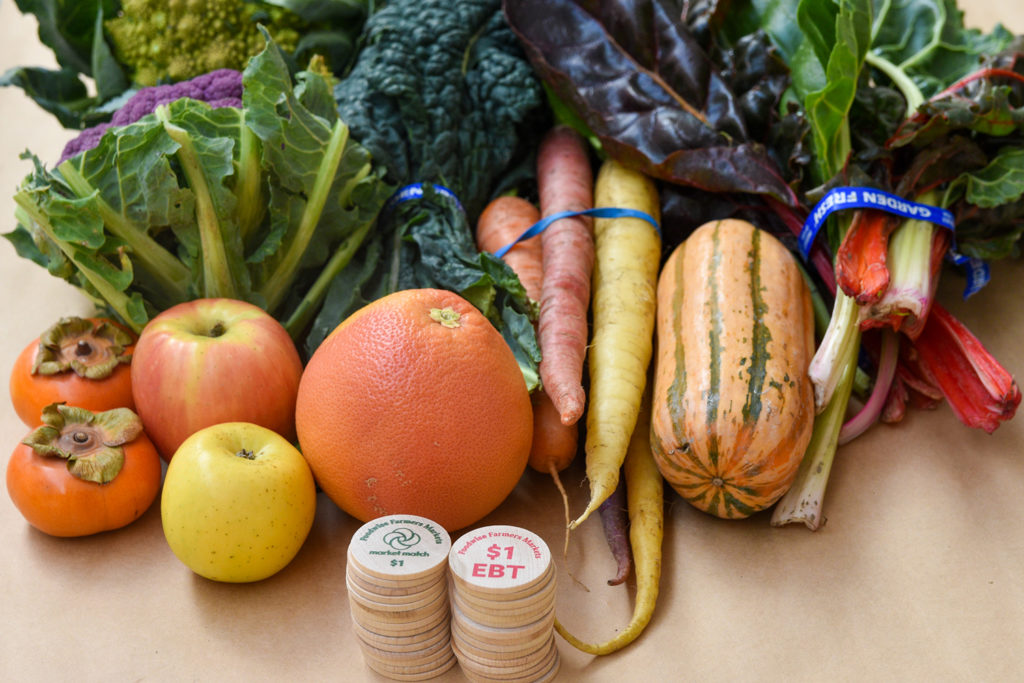Why CalFresh Matters: Protecting SNAP Means Protecting Community Health
May 16, 2025

For 60% of people, the cost of food is the biggest barrier to eating a healthy diet. Despite this fact, House Republicans are threatening to make deep cuts to the Supplemental Nutrition Assistance Program (SNAP), along with restricting the potential to increase benefits in the future. Now, more than ever, it’s important to spread awareness about the benefits of CalFresh, California’s SNAP/EBT program. If SNAP is defunded, many low-income families and older adults may lose access to these programs, and millions of Americans will face food insecurity, which is associated with a range of diseases and health issues.
At Foodwise and other California farmers markets, shoppers who use their CalFresh EBT card can double their benefits through our Market Match program. Programs like these are essential because they increase (or double) one’s SNAP budget for healthy food, which leads to better health outcomes throughout one’s life. A UC Berkeley study found that children who receive SNAP benefits are more likely to complete high school and have lower rates of stunted growth, heart disease, and obesity.

We interviewed Dr. Hilary Seligman, a professor and researcher at UCSF and founder of EatSF, also known as Vouchers for Veggies, another nutrition assistance program that provides benefits through clinics and community organizations. Her years of research in food access, food insecurity, and food policy have proven the health benefits of enrolling in SNAP. According to a study that Dr. Seligman co-authored, SNAP participants had fewer hospital and ER visits, and spent $1,400 less annually on healthcare when compared to others at their income level who were not enrolled. She shared more about the long-term benefits of SNAP and the importance of protecting this vital program.
Foodwise: Can you describe “nutrition security” and how it differs from “food security”?
Dr. Seligman: “Nutrition security” is a relatively new term that describes people’s ability to consistently and reliably afford foods that meet their nutritional needs and promote health and well-being. “Food security” has a broader focus on access to all foods. You can think of “nutrition security” as sitting at the intersection of diet quality, food security, and equity.
Foodwise: As the cost of groceries rises, what changes have you seen in your research about food insecurity? How should food assistance programs adapt?
Dr. Seligman: When the cost of groceries rises, people have to make difficult choices about which foods to prioritize. Healthier foods tend to cost more than less healthy alternatives, so healthier foods tend to get dropped the fastest. That is why, in many households, foods like fruits and vegetables and lean meats are described as “luxury items.” Ideally, food assistance programs adapt by providing access to more food or more money for food, and households adapt by signing up for these benefits when they need support.
Foodwise: Why should people apply for EBT if they are eligible? How can using SNAP benefits improve health?
Dr. Seligman: SNAP is good for your health! When people enroll in SNAP, they are able to afford more expensive foods that tend to be healthier, and they are also more likely to be able to afford other basic necessities that are good for their health (like co-payments for their medicines, or an appointment with their primary care doctor if they are feeling sick). Although it can be really challenging sometimes to enroll in these benefits and to stay enrolled once you have them, they can have important health benefits as well.
Foodwise: You mentioned in your interview with SciLine that many food-insecure families view organic fruits and vegetables as a luxury that they can’t afford on a tight budget. How can less ubiquitous food sources, like farmers markets, support increased access to fruits and vegetables?
Dr. Seligman: Farmers markets are an excellent source of fruits and vegetables, particularly because they have the added benefit of supporting local economies. Here in San Francisco, you can shop at the farmers market year-round, too. If you are on a limited food budget, you likely cannot prioritize organic for most, or even any, of your fruits and vegetables. That’s just fine. Eating any fruits and vegetables is the most important thing. When you can buy organic, prioritize fruits and vegetables, like berries, where it makes the biggest difference.
Foodwise: BIPOC households, as well as households with children, are more likely to be food insecure. How do programs like SNAP/EBT, Market Match, and EatSF foster equity in food access?
Dr. Seligman: Everyone deserves to have access to the foods they need to be healthy. But this is just not the case in the US today, especially for Black and Brown households and households with children. Programs like SNAP/EBT, Market Match, SF-Marin Food Bank, and EatSF help people access healthy food when the household budget is just not high enough otherwise. These are tremendous community assets! In the future, however, I hope to see programs that address the root causes of hunger in the US so that we do not need these programs to make up the gaps.
Foodwise: The Trump administration and House Republicans are proposing cuts to SNAP. How will that impact families who depend on these benefits? How does investment in programs like SNAP help save on US healthcare costs in the long term?
Dr. Seligman: SNAP cuts will increase rates of food insecurity and nutrition insecurity in the US. This will be difficult for everyone living in a household experiencing food insecurity. People will have to spend more time looking for food they can afford, eat poorer quality diets, and sometimes go without. The poorer quality diets will increase health problems and health care costs. (When we don’t address food insecurity, we “pay” for it in health care costs.) But cuts to SNAP do not only hurt families struggling with nutrition and food insecurity; these cuts also hurt local economies, food producers (like farmers), and food retailers.
Learn more about how you can double your CalFresh EBT benefits with Market Match and use other nutrition assistance benefits like Veggies for Vouchers at Foodwise farmers markets. Discover how programs like EatSF Vouchers for Veggies and SNAP/EBT support a healthier Bay Area community.
Take action now to protect SNAP from harmful cuts by writing to your representatives today.
Topics: Food access, Food justice
